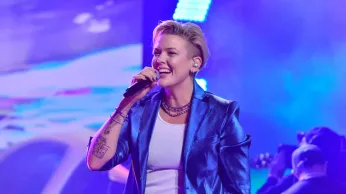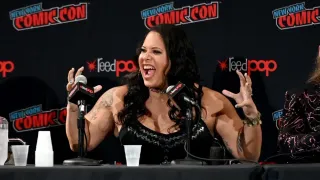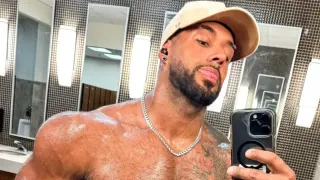
5 hours ago
Betty Who Faces Backlash After Podcast Comments Ignite Debate Over Bi Erasure and Queer Representation
READ TIME: 3 MIN.
Betty Who, the acclaimed pop singer and vocal advocate for LGBTQ+ visibility, has found herself at the center of an intense online debate following her appearance on the Made It Out podcast, released on August 19, 2025. During a candid discussion about her own bisexual identity and experiences in a straight-presenting marriage, Who’s comments on the fluidity of queerness, and recent discourse surrounding queer musicians in relationships with men, have been criticized for echoing some of the very stereotypes she sought to dispel. The fallout from her remarks has not only prompted backlash but also reopened vital conversations about bisexual visibility, bi erasure, and the unique dynamics between queer artists and their fans .
On the Made It Out podcast, hosted by Mallorie Glownke, Betty Who spoke at length about her journey as a bisexual woman married to a cisgender straight man. She described grappling with biphobia both from outside and within the LGBTQ+ community and discussed the challenges of maintaining her queer identity in a heteronormative relationship. In her own words, Who reflected on “carrying your queerness with you” even when it isn’t outwardly visible—an experience familiar to many in the community .
However, when the conversation turned to recent headlines about queer musicians JoJo Siwa and Fletcher, who have both been open about dating men after previously presenting as exclusively lesbian or queer, Who attempted to defend bisexuality and sexual fluidity. She expressed empathy for artists whose identities evolve publicly, remarking, “I hold space for if in 10 years she comes out and says, ‘Actually, I’m bi, or I’m straight’” .
While Who’s intentions were to promote acceptance for fluid sexual identities, many listeners and social media users interpreted her comments as inadvertently reinforcing harmful tropes—particularly the notion that lesbian identity is simply a phase or inherently unstable. Critics argued that by suggesting a lesbian artist could “change her mind” and later identify as bisexual or straight, Who echoed language often wielded to invalidate lesbian experiences .
The criticism was swift and pointed. LGBTQ+ commentators and activists highlighted the need for greater care when discussing queerness, especially given the history of bi erasure and lesbophobia in both mainstream and queer spaces. Some pointed out that while bisexual people often face erasure in discussions about queer relationships, so too do lesbians face a long legacy of having their identities questioned, dismissed, or reframed as merely “not having met the right man.”
The controversy around Who’s comments quickly spread across social media platforms like TikTok and X (formerly Twitter), with many LGBTQ+ users sharing their own experiences of bi erasure, invalidation, and the pressure to “pick a side.” Others used the moment to emphasize the importance of respecting individual identity journeys—while also recognizing the harm caused when high-profile figures repeat language that has historically marginalized lesbians .
In an op-ed for QNews, a lesbian writer observed, “We’re sick of hearing the same old trope that being a lesbian is just a pit stop on the way to something else. It doesn’t help anyone—least of all young people questioning their place in the world” .
Conversely, some voices in the bisexual and pansexual communities defended Who, noting that her personal narrative as a bisexual woman in a straight-presenting marriage is often misunderstood or dismissed by both straight and queer audiences. They argued that Who’s openness about her journey—her struggles with self-acceptance and public perception—reflects the complexities of living authentically in a world still learning to accept fluidity .
This incident has reignited broader discussions about the pressures placed on queer musicians, especially women and nonbinary people who are often expected to embody certain labels or narratives for their fans. Betty Who, who has long credited her LGBTQ+ following for her success, has spoken previously about the journey to self-acceptance, the influence of queer culture on her music, and the importance of authenticity .
Many artists, including JoJo Siwa, Fletcher, and Reneé Rapp, have faced similar scrutiny when their relationships or self-identifications evolve in public view. The reaction to these changes often reveals deep-seated tensions within the community about who “counts” as queer, and how much room there is for evolution without erasing or undermining others’ identities.
The conversation around Betty Who’s podcast appearance underscores the ongoing need for nuanced discussions about sexuality, identity, and representation—both within the LGBTQ+ community and in broader culture. Navigating these topics with care requires listening to marginalized voices, acknowledging the history of erasure and invalidation, and allowing space for growth and change without perpetuating harmful narratives.
As the discourse continues, many LGBTQ+ advocates are calling for compassion, accountability, and a renewed commitment to affirming the diverse experiences that exist within the community. For fans and artists alike, this moment serves as a reminder that language matters—and that the work of creating inclusive, supportive spaces is ongoing.






